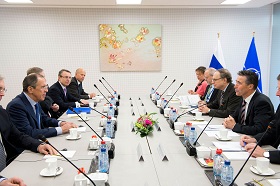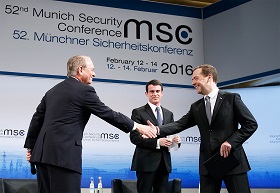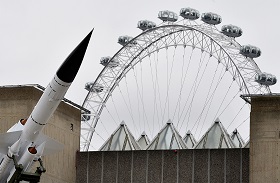On the April 20 the NATO-Russia Council convened in Brussels for the first time in almost two years. Two weeks earlier, the Netherlands held a consultative referendum on the Association Treaty of the European Union with Ukraine. Richard Sakwa, Professor of Russian and European politics at the University of Kent, shared his views on results of the Dutch referendum, the future for Ukraine in the EU after the referendum, Ukrainian crisis, as well as the challenges of NATO-Russia relations.
On the April 20 the NATO-Russia Council convened in Brussels for the first time in almost two years. Two weeks earlier, the Netherlands held a consultative referendum on the Association Treaty of the European Union with Ukraine. Richard Sakwa, Professor of Russian and European politics at the University of Kent, shared his views on results of the Dutch referendum, the future for Ukraine in the EU after the referendum, Ukrainian crisis, as well as the challenges of NATO-Russia relations.
The first meeting of the NATO-Russia Council in two years was held on April 20. Is this a sign of the long-awaited warming of relations? And how can a stable course be established in Russia-NATO relations today?
Obviously, it’s a good sign that Russia has finally been invited, and that the revival of the NATO – Russia Council came from the Western side. I think it was foolish for the meetings to have been suspended just when they were needed at the moment of crisis. It would have been a forum that could have allowed some of the potential dangers to be avoided. However, everybody is saying in the same framework that there can be no return to business as usual. Moreover, we need to have a new agenda of business as unusual. Many Russian public figures said that Russia should not participate in this meeting because by participating in this, it will accept the status quo, and the status quo is what created this crisis in the first place. We need to find a new agenda which can actually help break out from it. Indeed, business as unusual would be to break out from the impasse and the failures of the past, and by attending this meeting, your argument will work. The only thing to do is to establish the framework of a system that as we have seen does not work.
Why did the Netherlands vote “no” in the referendum on the Association Agreement between the EU and Ukraine? Given these circumstances, what is the future for Ukraine in the EU?
I must confess that I participated in the debates about the Dutch referendum. I spoke at two big meetings in Amsterdam, and I also was on Dutch television arguing against the ratification of this Association Agreement. The Association Agreement is a symptom of those failures which we have just talked about. This Agreement is between the European Union which is meant to be a community of values with the Ukrainian government which itself is repudiating those values through the persecution of Russian cultural institutions, journalists, the total breakdown of relations internally, the decommunization laws, etc. Even broader than this, the whole Eastern Partnership, as Radoslaw Sikorski, the former Polish Foreign Minister, is now openly saying, was always designed to separate Ukraine and the other countries from Russia. In other words, we need a new model of relations. The fact that Ukraine was not joining the European Union was absolutely clear before the referendum; and I suppose Ukraine will not join the European Union for 25 years or more. That was never on agenda. What the Dutch have said that it is a sign of a very great estrangement.
The Dutch referendum was an indicator of the emergence of resistance to the old model of the last 25 years which has led to this crisis. And what we are looking for and what the Dutch quite explicitly talk about is a plan of reconciliation across the European continent. When I was in Amsterdam there was a criticism of the Atlantic community and the United States’ continuation through NATO of a rather short-sighted regressive policy, even though NATO is obviously not threatening Russia in the military sense immediately. The idea was that a new model of relations – a new model of Pan-European continentalism would then ensure that Ukraine will not have to choose between Russia and the West. Ukraine cannot survive without Russia, because most of its industries are a myth. Germany has been spending five per cent of its GDP each year as transfers from West Germany to East Germany over the last 25 years. All that has done is to stabilize the same level of inequality between East Germany and West Germany. That’s what the Dutch referendum is all about.
In your book “Frontline Ukraine: Crisis in the Borderlands” you write “instead of overcoming the logic of conflict the EU became an instrument for its reproduction in new forms”. Has the EU become instrumental in provoking the crises not solving them? What is the role of NATO in these changes?
The paperback version came out this year.
The European Union has become subsumed into a large Atlantic community and it lost a lot of its activity and political autonomy. NATO and the European Union since the Berlin agreements of 2002 have a division of labor. They are like two halves of the same walnut, the military security and economics. That’s the problem - the European Union because of this is now a part of a type of hermetically closed Atlanticism which cannot open up, and this is why Russia is excluded from this European peace order. The crisis in Ukraine is part of that symptom, of that larger crisis. The European Union has stopped being a peace project. It’s actually reproduced the logic of conflict which is exactly the last thing we thought it would be. It’s a tragedy. And I think that some people in the European Union are beginning to understand that themselves.
What should be done in order to finally resolve the Ukraine crisis?
The Ukraine crisis can only be resolved when the larger European and global crisis is resolved. We can cool it down, hopefully, there can be some attempts to find a way of either implementing Minsk or a type of Minsk plus. This idea was put forward recently by Victor Medvedchuk for Rinat Akhmetov to become the governor of Donetsk. I think Russia was looking quite positively at this idea. Obviously, the only thing to do is to stop the killing, to stop the fighting, to stop the war. In part, the change of the Prime Minister in Ukraine will help that, since Yatsenyuk was an awful militaristic ideologist.
Where else could crises break out in Europe and Central Asia?
A massive crisis is building in Northern Afghanistan. It is threatening Tajikistan, Turkmenistan and Central Asia as a whole. Recently 8,000 fighters were transferred from the Swat valley in Pakistan to Northern Afghanistan. This is the biggest hotspot today. Transnistria and Moldova are dangerous regions as well.
As for the West-Russia crisis, is it a continuation of the old Cold War or this is a new Cold War?
There are elements of a continuation of the old Cold War which never stopped because it maintained its institutional and ideological framework in terms of NATO and the idea that Russia is a potential threat. And indeed, it’s a new Cold War because it has new conditions. However, I reject both models. Its elements, of course, continue, but what I think we’ve got to understand is that what we’re looking at now includes a whole series of new challenges. We really need to start thinking in new terms about how to establish a framework of a new peace order. The Atlantic community has become more and more solidified or fossilized, and it’s incapable of accepting new ideas. Dmitry Medvedev in June 2008 talked about a new European security treaty, and lots of people have talked in the same way. Unfortunately, none of these ideas have been developed, because they say “the system works fine”. But the system doesn’t work fine, as we saw in Ukraine in 2014, unless you simply say Russia is to blame for everything which doesn’t get you very far. So we have come to a vicious circle, we closed a vicious circle, and we must try to break out from the vicious circle.
Interviewed by Irina Sorokina, RIAC program assistant






